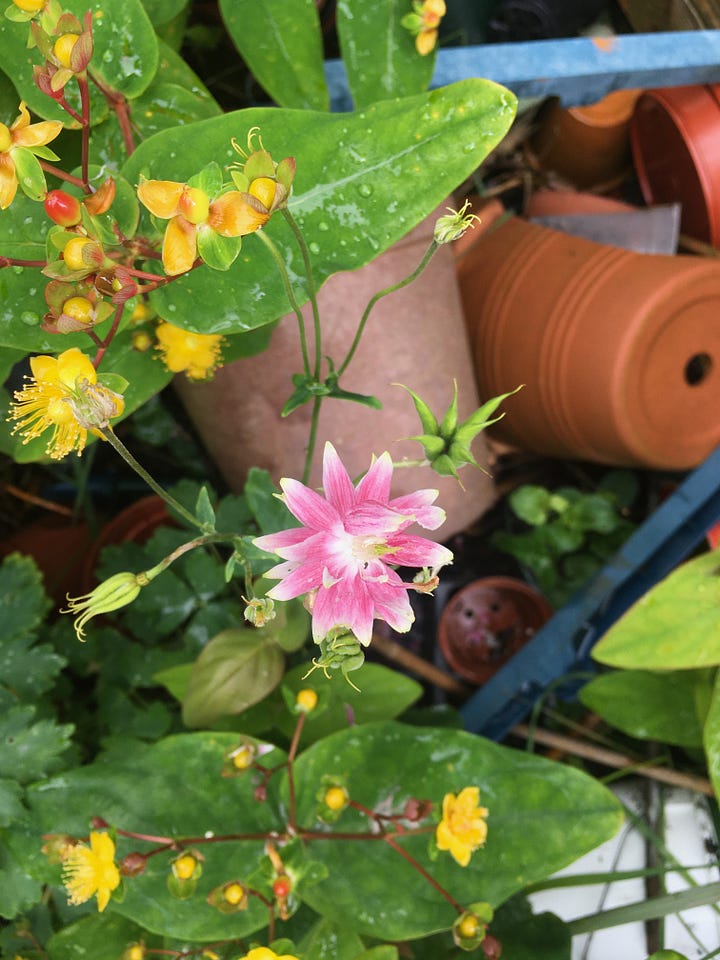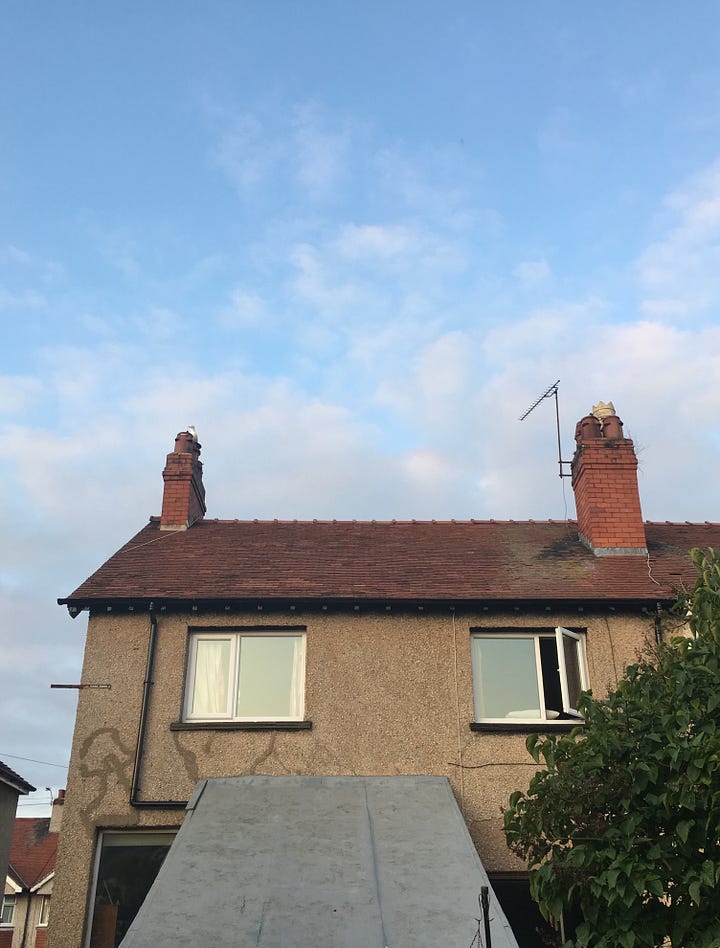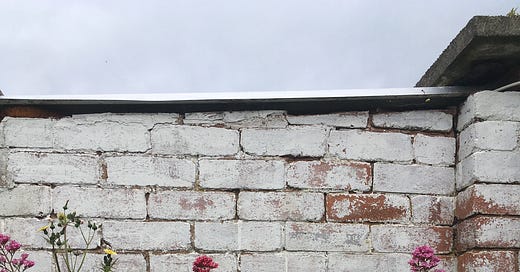Ghosts on the Stairs
Guest author Ellen Chapman meditates on death, grief and a beloved childhood home in North Wales
Words and images: Ellen Chapman
I’ve known this house since I was two years old. Ghosts of myself at every age between then and now crowd every room, jostling for space with past versions of my mum, my dad, my little brother. My childhood home, the house where Dad still lives, is a pebble-dashed semi-detached on the North Wales coast. The beach is a five-minute walk away, visible from my parents’ bedroom window.
Then, I sat on the stairs with the ghost of seven-year-old me. She’s crying, breaking her heart because her parents have gone out to a restaurant and she’s alone in the darkness with an unsympathetic babysitter. I was crying in the darkness too, straining my ears for the sound of Mum’s shallow breaths from the hospital bed we’d set up in the front room for her to do her dying in. I had to leave in the morning, return to my normal life, to my three-year-old son who needed his mum and to my office job, because the mortgage still needed to be paid even when the world was ending. I didn’t know if Mum would still be alive by the following weekend when I would be able to return to the house.
Now, I slip past both ghosts as I make my way downstairs. Morning sunlight streams through the stained glass in the front door. My children’s voices chatter from the front room as I pass it, asking my brother to explain the rules of the board game he’s teaching them. I can feel the almost physical pull of Mum’s ashes in their green plastic urn on the mantelpiece in there, but I ignore it for now. The back room is soft with shadows. Dad and my partner are both still asleep upstairs, so I’m alone. In the kitchen, I put the coffee machine on and make myself a mug of tea. The tea bags are still where Mum always kept them, in a jewel-coloured tin with a hinged lid that lives in the cupboard above the kettle.
I take my tea through to the green leather settee in the living room, curl up with ghostly versions of Mum and me. We were the early risers, up before the rest of the house most mornings, chatting over a cuppa and planning the day ahead. One of the cotton curtains that I remember from earliest childhood, printed with a William Morris design, has a large tear in it. So does the cushion I’m sitting on. Mum’s ghosts recede, dissolving into the beam of light that shines through the tear in the curtains. I can’t ignore her absence anymore.
Everything in this house is safe and familiar. I know which stair creaks when you step on it, and the sounds the central heating pipes make first thing in the morning. I know instinctively where to find a roll of sellotape, or needle and thread, a specific book, a spare pillow, even though it’s twenty years or more since I last properly lived here. I can wrap myself up in the house’s particular scent: old books and the patchouli oil Dad dabs on his wrists to hide the smell of tobacco. I can—mostly—slip back into the rhythms of this house when I visit. But every time I do, there’s always a moment where the reality of Mum’s death reasserts itself, my stomach dropping like the moment on a rollercoaster when it starts to plunge downhill.
This time it’s the tear in the living room curtains. Next time it might be the tide marks on the wall above the dining table, from where a pipe burst and Dad hasn’t repainted yet. The bathtub ringed with layers of soap scum. The wallpaper on the stairs that’s starting to peel. The fact that her clothes have vanished from the wardrobe and chest of drawers she shared with Dad. The spices in the kitchen cupboard that have lain untouched since her death, their use by dates receding into the past alongside her.


It’s almost ten years since she died. The house as it was when she was alive is slowly decomposing in her absence. Mum feels very close when I’m here, her ghost hovering somewhere just behind my shoulder, just out of sight. Sometimes it’s almost like she’s looking out through my eyes, and I can hear her voice, hear what she’d say about the house’s slow decay. I have to physically stop myself from grabbing cream cleaner and sponge to scrub the bathtub, or needle and thread to stitch up the tear in the curtains. I remind myself—I tell Mum—that I don’t live here anymore. It’s not my job to try to fix things. And that maybe Dad needs the visual reminders to prove that she’s gone, so that he can live here without half expecting her to walk into the room at any moment.
Dad always says that it was Mum’s house more than it was his. There’s a lot of layers of meaning to unpack in that statement, but at the root of it I think he means that it was Mum who made this house a home. In her absence it’s still a home, but the spark of energy that sustains it is flickering and uncertain, always on the edge of going out. The house is the same as I remember it, an unbroken thread connecting me to my childhood memories, but at the same time it is fundamentally changed. It’s unheimlich, un-homely, an uncanny funhouse mirror version of itself. I can no longer rely on it for stable foundations.
Nothing is solid, nothing is certain. The house has changed, and so have I. Since Mum’s death I’ve felt unbalanced, something out of alignment deep inside me. The world doesn’t quite make sense anymore. I know that things—or people—might change or disappear at any moment, without warning. I’ve had to learn new ways to build a life in this mirror world, learned to live with a gaping hole punched through the centre of things. My roots feel shallower than they used to, but they stretch further, beyond this house by the sea to another, 200 miles north, where I’ve made a new home in an inland river valley.
I’ve learned how to slip my anchor, how to let houses and homes, life and my sense of self, become fluid and shifting. I’ve learned that I can set a course, but I’ve also learned that sometimes I need to drift where the current takes me. This house with its constant reminder of what is missing—of who is missing—is a lodestone, pointing the way. It teaches me that everything is uncertain and nothing is guaranteed—and because of that, every moment is infinitely precious. Time only flows in one direction.
I take my half-drunk mug of tea and go through to the front room to join my children’s laughter and my mother’s ashes.







Ellen, this is incredibly beautiful and incredibly moving. I can so relate to many of the feelings and realities you’re experiencing in this changed and somewhat unwelcome world we live in after losing our mothers. I love the way you’ve weaved different timelines together to help us glimpse the worlds you’ve lived through. Thank you for sharing, I can’t wait to read more of your work.
Such a beautifully written piece. I recognise so much of what you’ve written in myself. My mum passed away a couple of years ago and the house is as she left it. The same out of date spices in the kitchen cupboard and her nail varnish and emery boards on the sideboard. When I visit my dad, my mum feels so close, yet so very absent. The decline of the house is so evident to me, but I it’s not for me to fix. That realisation has only just come to me this week. Your words have echoed this and that’s a comfort. Thank you x